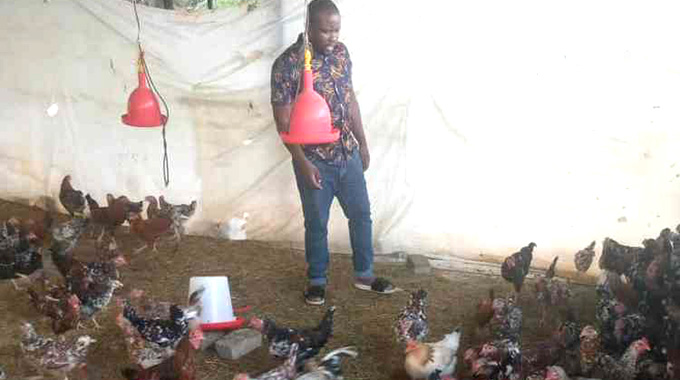
Mirriam Madiye
Features Writer
At the age of 34, Tamiswa Njovana of Shurugwi has broken stereotypes that farming is for the older generation.
He is one of many young farmers that are changing the face of Zimbabwe’s agriculture.
At that youthful age, Tamiswa is taking up farming as a viable career option.
This growing interest in farming by young people is reshaping and transforming the agricultural sector.
Having inherited a farm from his grandfather, Rockford Farm in Ward 3, Shurugwi, without an agricultural background or expertise skills in farming, Tamiswa ventured into agriculture.
He took interest in gaining farming knowledge about crop rearing and agronomy.
“My projects started concurrently three years ago with only 20 chickens, but now l have lost count of the chickens which comprise road runners, Boschers and layers,” he said. “I also have 150 goats and more than 50 cattle. I am also into horticulture, rabbit keeping and pen fattening.
“Currently, l have planted 13 hectares of maize which l will harvest any time soon. l have not yet started selling the chickens, but I am focusing mainly on laying and hatching the eggs.”
Starting farming was never easy for Tamiswa.
“I did not apply for any loan from the bank, as the banks do not give youths loans without collateral demands,” Tamiswa says. “So, l had to use the little money I had to start the projects, which was not sufficient.”
Tamiswa has also created employment for other people.
“A number of youths in and around my community have managed to gain employment at the farm,” he says. “All the projects have been successful and I have expanded them. Three field days were held at our farm, attracting farmers, Agritex officers and other members from the surrounding wards to share information and share experiences.”
Farming is never easy and challenges abound, says Tamiswa.
“We are reeling from the impact of climate change and the intensity of droughts is increasing,” he says. “We need drought resistant crops to get better yields. Funding is difficult for our projects. As young farmers, we need more funding so that we can expand our farming activities and build better farming infrastructure.”
Tamiswa urged other young people to get involved in different projects being spearheaded by the government to support young farmers.
“As young people, we are the future leaders of the country and our communities,” he says. “We have all the capabilities to venture into farming if we set our eyes and hearts to do it. The youths should not waste time and resources doing unproductive things.

The thriving maize crop in Tamiswa Njovana’s field
“There is a need to get involved in all programmes that can develop and equip ourselves with different skills. Youths need to remove the mentality that money is found in urban areas only, wherever one is, there is money.
“Let us learn to utilise all the available resources at our disposal such as land to the maximum, no matter how small the portion might be.”
With earnings from his farming ventures, Tamiswa is now able to fend for his family and expand his operations.
Besides being a farmer, he is also the councillor in his ward for the past eight years.
“The government is doing a commendable job through the Ministry of Public Service, Labour and Social Welfare in catering for the welfare of people living in the rural areas around the country,” he says.
“Rehabilitation of roads which were damaged by heavy rains this year is underway and people are involved in these efforts.”
Tamiswa is keen to support other young people to take up farming as a livelihood opportunity.
“Farming has opportunities for the youth to become empowered and self–reliant,” he says.
Making agriculture more attractive to young people can help create decent employment opportunities for them in rural areas and reverse perceptions and stereotypes that agriculture is hard and less attractive to venture into.
A number of young people still complain that agriculture is hard and boring, with little income.
The youth make about half of the country’s 13 million people and should play an important role in shaping and influencing the direction of Zimbabwe’s future food security.
Africa has the youngest population in the world, according to the United Nations.
There were 226 million people aged between 15 and 24 in 2015, about 19 percent of the global total and this figure is expected to double by 2045.
Southern Africa also has one of the highest youth unemployment rates on the continent, with 53 percent of young women and 43 percent of young men, not employed.
Making agriculture attractive to the young is critical for employment creation and to spur economic and social transformation.
Development experts say Africa’s rural youth face particular barriers to accessing productive employment.
